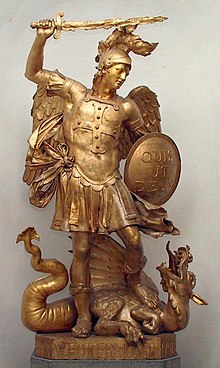Quis ut Deus?

Quis ut Deus? (or Quis sicut Deus?), a Latin sentence meaning "Who [is] like God?", is a literal translation of the name Michael (Hebrew: מִיכָאֵל, transliterated Micha'el or Mîkhā'ēl).
The sentence Quis ut Deus? is particularly associated with Archangel Michael.[1][2] In art, St. Michael is often represented as an angelic warrior, fully armed with helmet, sword, and shield, as he overcomes Satan, sometimes represented as a dragon and sometimes as a man-like figure. The shield at times bears the inscription: Quis ut Deus,[3] the translation of the archangel's name, but capable also of being seen as his rhetorical and scornful question to Satan.[4]
The Scapular of St. Michael the Archangel also bears this phrase.[5]
See also
[edit]- El (deity)
- Song of the Sea
- Michaelion
- Michaelmas
- Novena to Saint Michael
- Prayer to Saint Michael
- Saint Michael in the Catholic Church
References
[edit]- ^ John Elven, 1854, The book of family crests Henry Washbourne Publisher, page 112
- ^ Ann Ball, 2003 Encyclopedia of Catholic Devotions and Practices ISBN 0-87973-910-X page 520
- ^ "CATHOLIC ENCYCLOPEDIA: St. Michael the Archangel". www.newadvent.org.
- ^ Studies in Revelation by Hampton J. Keathley, 3rd, J. Hampton Keathley III 1997 Biblical Studies Press ISBN 0-7375-0008-5 page 209
- ^ John F. Sullivan, 2009 The Externals of the Catholic Church ISBN 1-113-71408-5 page 202
External links
[edit]![]() Media related to Quis Ut Deus at Wikimedia Commons
Media related to Quis Ut Deus at Wikimedia Commons
